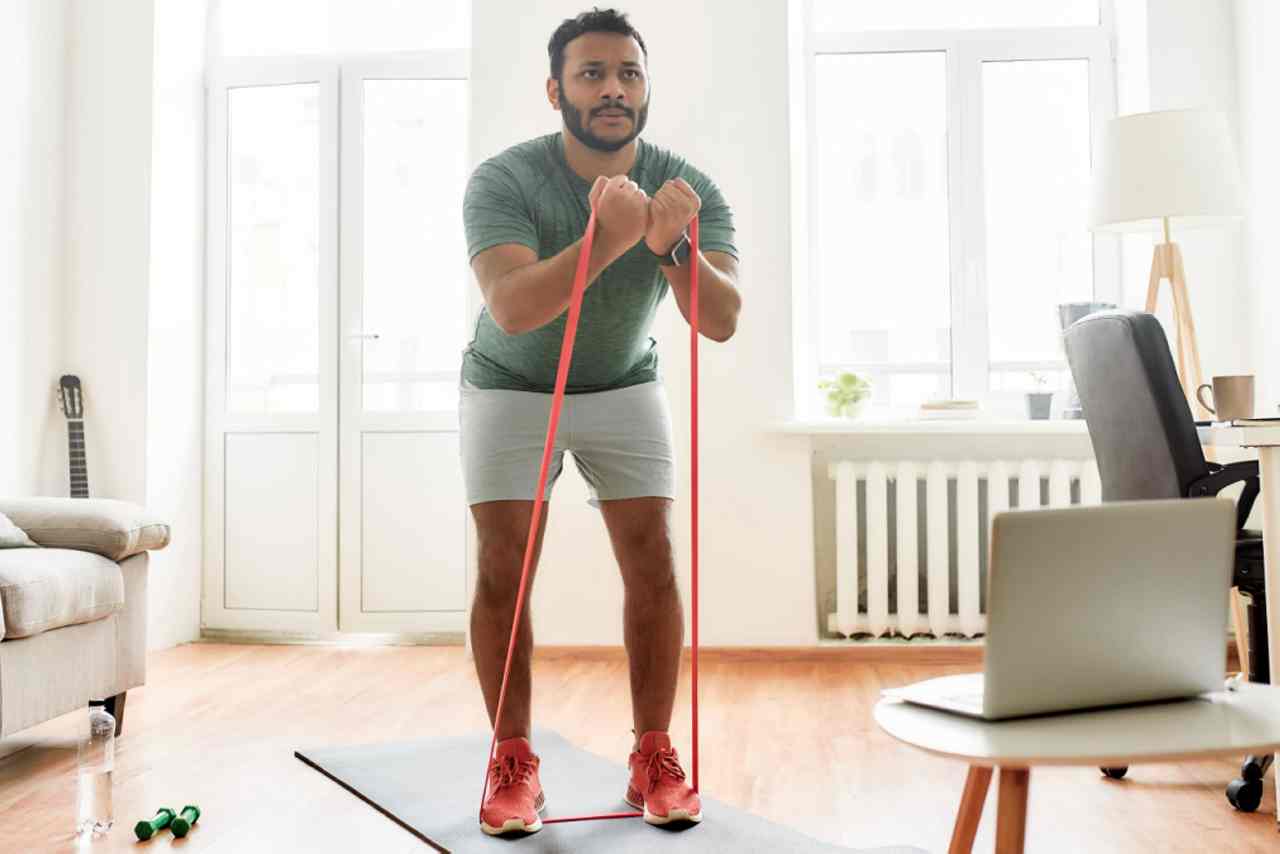Travel is inevitably associated with a departure from normal routine, but regular resistance exercise is one habit you don’t want to leave behind.
Resistance training helps to maintain and improve physical health, appearance, and strength. Strong evidence even links resistance training to reduced risk of death from all causes. (1) Beyond these obvious benefits, resistance training is emerging as a potential intervention to support mental health. (2)(3)
For the sake of your body, lifespan, and mind, resistance training must be accomplished during travel. Since hitting the weights can be challenging when you’re on the road, here are three travel-ready workouts for your next expedition.
World-Class Travel Workouts
- With Bodyweight
- With a Resistance Band
- In a Hotel Gym
Bodyweight-Only Traveler’s Workout
Staying in a hotel or short-term rental with no fitness facility? Fortunately, bodyweight training is a viable option to hit nearly all major muscle groups.
No Weights, All the Gains
This quick and efficient bodyweight workout can be performed in the comfort of your hotel room or short-term rental bedroom. Classic exercises like the push-up are combined with challenging moves that train body parts you might not have known were possible using bodyweight. Since strength levels and body weights vary, a wide range of repetitions are suggested for this workout. Shoot for a repetition target that results in a challenging set.
Push-Up
Watch this video on YouTube
- How to Do it: Lie on the floor with your palms under or just outside of your shoulders and your toes dug in to the floor. While maintaining a ridged plank (straight line through your torso and legs), push through your palms until your elbows are straight. Lower with control.
- Sets and Reps: 3 x 5-20
- Rest time: Rest 60 seconds between sets.
Pike Push-Up
Watch this video on YouTube
- How to Do it: Begin in a high plank or push-up position supported on palms and toes with straight arms and straight legs. Push back into the “pike” position by shifting your hips back and keeping your back straight, inverting your head downward. Perform a push-up by lowering your forehead toward the floor then pushing back to the v-shaped pike position.
- Sets and Reps: 3 x 5-15
- Rest time: Rest 60 seconds between sets.
Rear Foot Elevated Split Squat
Watch this video on YouTube
- How to Do it: Set up for the Rear Foot Elevated Split Squat, also known as Bulgarian Split Squat, by sitting on the edge of the bed and straightening your working leg in front of you, with your heel on the floor. Maintain this foot placement as you stand, and place your non-working foot behind you on the bed. Lower your body toward the floor with control, then return to standing. Keep most of your weight through your front foot, not on the rear support foot.
- Sets and Reps: 3 x 10-20 per leg.
- Rest time: No rest between legs. Rest 60 seconds between sets.
Elevated Single-Leg Bridge
Watch this video on YouTube
- How to Do it: Lie on your back perpendicular to the bed with your knees bent approximately 90 degrees. Place your working side heel atop the bed, while maintaining the other leg unsupported. Bridge your hips up by driving your heel into the bed and extending your hip. Lower with control.
- Sets and Reps: 3 x5-15 per leg.
- Rest time: No rest between legs. Rest 60 seconds between sets.
Side Plank
Watch this video on YouTube
- How to Do it: Lie on your side with your support arm on the floor directly under your shoulder. Straighten your support arm and reach your top arm to the ceiling. For balance, widen your base by placing the heel of your top leg far in front of the toes of your bottom leg. Imagine a straight line running through your nose, chin, sternum, and zipper. Don’t let your hips drop toward the ground. Hold this position for time before switching sides.
- Sets and Hold Duration: 3 x 20-30 seconds per side.
- Rest time: No rest between sides. Rest 60 seconds between sets.
Travel Workout with a Resistance Band
Along with a toothbrush, deodorant, and clothing, a resistance band belongs on your list of “travel essentials.” One simple resistance band allows you to train and add resistance to movement patterns that might otherwise be impossible without access to a gym. Best of all, a resistance band is light, easy to pack, and inexpensive.
Have Band, Will Travel (and Train)
This workout can be completed with a single loop-style resistance band (41-inch / approximately one meter) of moderate thickness. Select a band between 0.5 and 1.5 inches (1.27 to 3.81 centimeters) thick, depending on your strength.
Band Pull-Apart
Watch this video on YouTube
- How to Do it: Stand with the resistance band loop around your torso. Hold a short length of band in front of your shoulders with outstretched arms, palms down. Stretch the band by pulling your arms apart and squeezing your shoulder blades together. Return to the starting position.
- Sets and Reps: 3 x 10-20
- Rest time: Rest 90 to 120 seconds between sets.
Band Push-Up
Watch this video on YouTube
- How to Do it: Wrap the band around your mid-back, below your shoulder blades. Pin the ends of the band under your palms and begin the exercise in the top push-up position — supported on your palms and toes with your elbows straight. Lower your body toward the floor, then return to the top position.
- Sets and Reps: 3 x 5-12
- Rest time: Rest 90 to 120 seconds between sets.
Band Split Squat
Watch this video on YouTube
- How to Do it: With the band looped around the base of your neck or across your upper back, securely anchor the other end under one foot. For safety, hold the band with both hands during the exercise. Take a large step back with the leg that isn’t atop the band. While keeping most of your weight over your front foot, lower your body toward the floor by bending your hip, knee, and ankle. Drive back to the top position. Perform all reps with this foot position before carefully switching legs.
- Sets and Reps: 3 x 10-20 per leg.
- Rest time: No rest between legs. Rest 90 to 120 seconds between sets.
Band Row
Watch this video on YouTube
- How to Do it: Place one foot securely on the center of your band. Hold the ends of the band with a neutral grip (palms facing each other) and perform a modified bent-over row by drawing your upper arms and shoulder blades back. Return to the starting position.
- Sets and Reps: 3×10-20
- Rest time: Rest 90 to 120 seconds between sets.
Band Half-Kneeling Single-Arm Overhead Press
Watch this video on YouTube
- How to Do it: Hold the band with one hand just above shoulder-height and anchor the other end of the band securely under the same-side knee. Place your opposite foot flat on the floor in front of you. Perform the press by stretching the band toward the ceiling until your elbow is straight but not fully locked out. Return to the starting position.
- Sets and Reps: 3 x 10-20 per arm.
- Rest time: No rest between arms. Rest 90 to 120 seconds between sets.
Band Good Morning
Watch this video on YouTube
- How to Do it: With the band looped around the base of your neck or across your upper back, securely anchor the other end under both feet. For safety, hold the band with both hands during the exercise. Perform the good morning by hinging forward at the hips while keeping your back straight and your legs slightly bent. Return to the standing positioning.
- Sets and Reps: 3 x 10-20.
- Rest time: Rest 90 to 120 seconds between sets.
Band Hammer Curl
Watch this video on YouTube
- How to Do it: Stand with both feet securely on a short length of the band. Grasp the other end of the band with your arms at your sides and your palms facing inward. Perform a hammer curl by bending your elbows as you stretch the band. Return to the starting position.
- Sets and Reps: 3 x 10-20
- Rest time: Rest 90 to 120 seconds between sets.
Workout for the Hotel Gym
The typical hotel gym or “fitness center” is minimalist, to say the least. If you’re lucky, you might find a few treadmills or stationary bikes, a set of dumbbells up to 40 or 50 pounds, an adjustable bench, and, potentially, a random assortment of strength machines. However, even a simple hotel setup is nothing to scoff at. It can provide the tools for a high-quality, full-body resistance training workout.
Get Your Money’s Worth
This workout focuses on building muscle, also known as hypertrophy. A range of 8 to 12 repetitions is the traditional recommendation for muscle growth. (4) For strong lifters, a hotel gym might not offer adequate weight to achieve challenging sets in this repetition range. To remedy this predicament, the hotel workout uses advanced exercise variations, mechanical drop sets, and intensification techniques to ensure a stimulating level of effort is achieved.
Heels-Elevated Dumbbell Front Squat
Watch this video on YouTube
- How to Do it: Elevate your heels one to three inches (approximately 2.5 to 7.5 centimeters) by placing them on the frame of an incline bench. Alternatively, weight plates or squat wedges can be placed under your heels. Hold the dumbbells atop your shoulders. Keep your torso upright as you squat deeply and drive your knees forward to bias the quadriceps. (5) Return to a standing position.
- Sets and Reps: 4 x 8-12
- Rest time: Rest 90 to 120 seconds between sets.
Bench-Supported Dumbbell Row with Alternating Isometric
Watch this video on YouTube
- How to Do it: Set an adjustable bench to 45-degrees and lie face down holding two dumbbells. Row both dumbbells to the top position by pulling your arms and shoulder blades back. Hold the dumbbell on the left side in the top position as you lower the dumbbell on the right side and row it back up. Next, hold the right dumbbell in the top position as you lower and lift the left dumbbell. Alternate sides with each repetition.
- Sets and Reps: 4 x 8-12 per arm.
- Rest time: Rest 90 to 120 seconds between sets.
Single-Leg Dumbbell Romanian Deadlift
Watch this video on YouTube
- How to Do it: Hold two dumbbells at your sides and carefully lift one leg into the air behind you. Maintaining a slight bend in your standing leg, fold forward at your hips until you feel a profound stretching sensation in the hamstrings of your working leg. Return to standing. Perform all reps with one leg before switching sides.
- Sets and Reps: 4 x 8-12 per leg.
- Rest time: No rest between legs. Rest 90 to 120 seconds between sets.
Seated, Incline, and Flat Dumbbell Press Drop Set
Watch this video on YouTube
- How to Do it: This is a mechanical drop set — It uses the the same set of dumbbells and progresses from the most challenging exercise to the least challenging exercise with littler to no rest between each movement. Improved leverage (and mechanical advantage) will allow your muscles to continue after initial fatigue. Set an adjustable bench to a fully upright position. Perform a set of seated overhead presses by pushing the dumbbells from jaw-height to lockout overhead. When your muscles fatigue, adjust the bench to 45-degrees and perform a set of incline dumbbell presses, pushing the dumbbells from your upper chest to overhead. After reaching muscular fatigue again, finally adjust the bench to flat. Perform classic flat dumbbell bench press by pushing the dumbbells from your chest toward the ceiling.
- Sets and Reps: 4 x 8-12 for each movement (you may get fewer reps on the latter two exercises due to cumulative fatigue).
- Rest time: Rest only long enough to adjust the bench for each movement. Rest 90 to 120 seconds between sets.
Incline Dumbbell Triceps Extension
Watch this video on YouTube
- How to Do it: Perform two arm exercises back-to-back without rest as a superset. Set the bench to a 45-degree angle and perform the incline dumbbell triceps extension — Hold the dumbbells alongside your head with your elbows pointed toward the ceiling. Straighten your elbows to lift the dumbbells, then control them back to the starting position.
- Sets and Reps: 4 x 8-12
- Rest time: No rest before moving to the next exercise. Rest 90 to 120 seconds between sets.
Incline Dumbbell Curl
- How to Do it: Stay on the bench and begin the incline dumbbell curl with your arms hanging at your sides and your palms forward. Curl the dumbbells without allowing your upper arms to swing, then control them back to the starting position.
- Sets and Reps: 4 x 8-12
- Rest time: Rest 90 to 120 seconds before returning to the previous exercise.
Resistance Training on the Road
Travel can be hard on the body. Changing time zones and forced sedentary behavior in a car, plane, or train threaten to disrupt our normal rhythms and routines. Fortunately, dedicated resistance exercise can be restorative. It maintains training consistency and enables ongoing realization of resistance training benefits. Whether you check into the hotel gym, use a resistance band, or simply show up for bodyweight workouts, be sure to pack resistance training for your next trip.
References
- Shailendra, P., et al. (2022). Resistance training and mortality risk: A systematic review and meta-analysis. American Journal of Preventive Medicine, 63(2), 277-285.
- Carneiro, L., et al. (2020). The effects of exclusively resistance training-based supervised programs in people with depression: A systematic review and meta-analysis of randomized controlled trials. International Journal of Environmental Research and Public Health, 17(18), 6715.
- O’Connor, P. J., Herring, M. P., & Caravalho, A. (2010). Mental health benefits of strength training in adults. American Journal of Lifestyle Medicine, 4(5), 377-396.
- Schoenfeld, B., et al. (2021). Resistance training recommendations to maximize muscle hypertrophy in an athletic population: Position stand of the IUSCA. International Journal of Strength and Conditioning, 1(1), 1-30
- Fry, A. C., Smith, J. C., & Schilling, B. K. (2003). Effect of knee position on hip and knee torques during the barbell squat. The Journal of Strength & Conditioning Research, 17(4), 629-633.
Featured Image: BAZA Production / Shutterstock
About Merrick Lincoln
Dr. Merrick Lincoln is an Assistant Professor of Kinesiology at Saginaw Valley State University, a Physical Therapist in Midland, Michigan, USA, an applied biomechanics researcher, a strength and conditioning coach, and an author for scholarly and fitness publications including Strength and Conditioning Journal and T-Nation.













